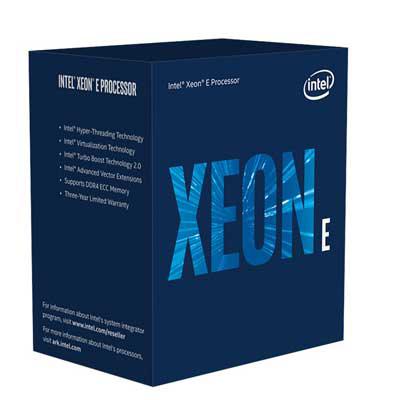New Intel Xeon E Workstation Chip Could Create 'Significant Refresh Opportunity'

Intel revealed new Xeon processors on Thursday for entry-level workstations that could give channel partners "a significant refresh opportunity," according to a company marketing lead.
The Santa Clara, Calif.-based company's new Xeon E processors support up to six cores, 12 threads and a 3.8 gigahertz frequency, with recommended pricing ranging from $193 to $450 — which Intel said is meant to provide value-conscious customers a "powerful combination of performance and capabilities for entry-level workstations."
"We feel that for professionals that have systems three-to-five years old, this is a great opportunity for those customers to get back into the market and purchase given the capabilities that the new Xeon E processors provide," Jason Kennedy, director of data center product marketing at Intel, told CRN during a conference call.
Lenovo and Dell are supporting Xeon E's Thursday launch with new workstations, including the Dell Precision 3930 Rack that will start at $899. HP is also planning to release a unit that supports Xeon E. Kennedy said "many other names familiar in the workstation space" will be coming out with their own Xeon E products.
Intel plans to offer channel partners incentives for selling the Xeon E, Kennedy said, though he did not provide any specific details on what kind of incentives would be offered.
Kennedy said the Xeon E family, which is launching with 10 processor units, is targeted at multiple verticals, including engineering, education, finance and healthcare.
"We're really excited about where this family can extend the innovation and growth we've experienced in the workstation space," he said.
The Xeon E is replacing 2017's Xeon E3-1200 processor and provides a performance increase of up to 1.36X, according to an internal Intel benchmark. Compared to its predecessor, the Xeon E is 1.45X faster when running financial services application, as well as 3D modeling and animation applications.
Kennedy said the Xeon E isn't only aimed at professionals that have aging workstations but also those who haven't entered the workstation space yet.
"We feel this product line will provide an on-ramp to professionals," he said.
Kent Tibbils, vice president of marketing of a Fremont, Calif.- ASI Corp., one of Intel's largest distributors, said he agrees with Kennedy that there is a big refresh opportunity in the workstation space, as well as the broader market for high-performance PCs.
"Everything at the higher end is growing, so I think performance PCs in the client space, whether for gaming or a professional system at home, I think more and more people are recognizing they can do more with their PC and they need it do more," Tibbils said, which is resulting in higher average selling prices — something that helped drive growth in Intel's PC business in the first quarter.
Jason Kimrey, Intel's U.S. channel chief, told CRN in a recent interview that he believes a confluence of factors have resulted in a great PC refresh opportunity for channel partners. Those factors include the availability of Windows 10 and the end of Microsoft's support for Windows 7, as well as better form factors, battery life and performance.
"You've just got kind of this aging PC fleet when people need to get work done faster, create content, more now than ever before," he said.
While Intel is promoting the Xeon E as a processor for entry-level workstations, the company needs to ensure it does enough to outline what differentiates the new chip from Intel's higher-end Core processors that are targeted for the desktop and notebook market, Tibbils said.
"When they come out with these new processors, do a little more to call out these specific features to explain why this is beneficial in the workstation space," he said.
During Kennedy's call with analysts and journalists on Wednesday, he was asked what separates the Xeon E from the Intel Core i7-7800X X-Series, which supports the same number of cores and threads and has a slightly lower base frequency and turbo frequency.
"It's a bit apples to apples," Kennedy admitted. But he said while the X-Series chip is built for the enthusiast market and could be used in some professional settings, the Xeon E was designed specifically with stronger reliability and more rigor than what's offered by the Core chips.
In a follow-up email, an Intel spokesman said the Xeon E is a "uniquely architected and crafted solution for entry workstation professionals" that provides expandability, hardware-specific security and reliability features. The spokesman added that the Xeon E has "received additional product design, testing, validation and support not available on Core processor-based solutions."
Xeon E features and capabilities not seen in Core processors include Advanced Vector Extensions, support for error-code correcting memory support, and greater I/O configurations for PCIe 3.0, USB 3.0/3.1, SATA, Thunderbolt, Optane memory and other capabilities.
Still, customers will have to decide if Xeon E stands out enough with its extra features since the new Dell Precision 3930 Rack and Lenovo ThinkStation P330 workstations both support Xeon E and Core processors.
While Kennedy couldn't identify an equivalent offering from AMD, he admitted the archrival has "some renewed energy and theoretical excitement around their products."
"We do always look to make sure our offerings are as compelling as possible from overall capabilities and demand needs as use cases continue to evolve," he said.